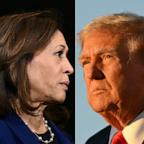2024's political instability didn't show up in the polls
This summer saw major political events occur one after the other (or occasionally at the same time), with unprecedented news breaking seemingly almost every week about the presidential race. Between the assassination attempt on Trump to Biden's disastrous debate performance that ultimately led him to drop out of the race, it's fair to say that this summer was one of the most volatile periods in recent presidential campaign history.
But the unpredictability of news events didn't necessarily translate to huge swings in the polls. In fact, we've had one of the steadiest presidential races in modern history, according to the polls. Before Biden dropped out, neither candidate's standing in our old national polling average changed by more than 3 percentage points over a span of almost five months. The story is similar in our new average that we launched after Harris took the reins as the Democratic nominee. Compare that to the 2020 campaign, where Biden maintained a consistent lead, but the polling average changed more dramatically throughout the year, with a difference of over 7 points between the largest and smallest margins.
There's been a variety of theories floated about why this year's polling looks more stable than past cycles. The shift may be a result of pollsters making methodological choices that increase the stability of the polls, or it could just be a reflection of a stubbornly polarized electorate in which relatively few voters are actually up for grabs from either campaign. Either way, 2024 has emerged as one of the most stable presidential elections in the modern polling era.






